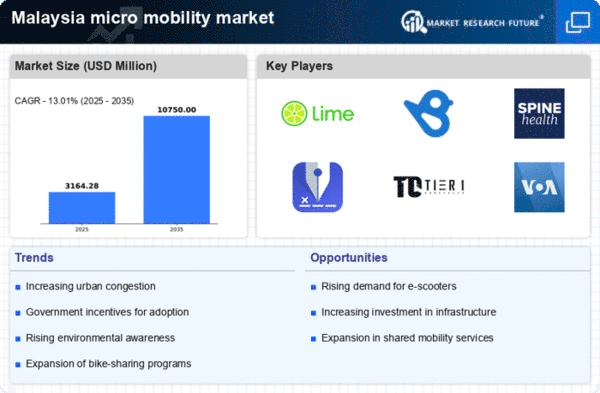Environmental Awareness
Growing environmental awareness among Malaysians is a key driver of the micro mobility market. As concerns about climate change and air pollution rise, more individuals are seeking eco-friendly transportation alternatives. The micro mobility market is well-positioned to capitalize on this trend, as e-scooters and bicycles produce significantly lower emissions compared to traditional vehicles. Surveys indicate that approximately 70% of urban residents in Malaysia are willing to switch to greener transport options, suggesting a strong market potential. This shift towards sustainable transportation is likely to encourage investments in micro mobility solutions, further enhancing their presence in urban areas.
Technological Advancements
Technological advancements are reshaping the micro mobility market in Malaysia. Innovations in battery technology, GPS tracking, and mobile applications are enhancing the user experience and operational efficiency of micro mobility solutions. For instance, the introduction of smart e-scooters equipped with advanced features such as real-time tracking and automated locking systems is attracting more users. The micro mobility market is likely to benefit from these advancements, as they not only improve safety but also increase the convenience of using these modes of transport. As technology continues to evolve, it may further drive the growth of the micro mobility market, making it a more attractive option for urban commuters.
Urban Congestion Mitigation
The micro mobility market in Malaysia is increasingly driven by the need to alleviate urban congestion. As cities expand, traffic congestion has become a pressing issue, leading to longer commute times and increased pollution. Micro mobility solutions, such as e-scooters and bicycles, offer a viable alternative for short-distance travel, potentially reducing the number of cars on the road. In urban areas like Kuala Lumpur, where traffic congestion can lead to economic losses estimated at $1.5 billion annually, the adoption of micro mobility options may provide a cost-effective solution. The micro mobility market is thus positioned to play a crucial role in addressing these challenges, promoting efficient transportation methods that can enhance urban mobility and reduce environmental impact.
Changing Consumer Preferences
Changing consumer preferences are reshaping the landscape of the micro mobility market in Malaysia. Younger generations, particularly millennials and Gen Z, are increasingly favoring flexible and convenient transportation options over traditional car ownership. This demographic shift is driving demand for micro mobility solutions, which offer affordability and ease of use. The micro mobility market is responding to this trend by providing diverse options, including e-scooters and shared bicycles, that cater to the needs of urban commuters. As consumer preferences continue to evolve, the micro mobility market is likely to experience sustained growth, reflecting a broader shift towards more sustainable and efficient urban transportation.
Government Initiatives and Support
Government initiatives in Malaysia are significantly influencing the micro mobility market. Policies aimed at promoting sustainable transportation options are being implemented, including subsidies for electric vehicles and infrastructure development for bike lanes. The Malaysian government has allocated approximately $200 million for the development of cycling infrastructure, which is expected to enhance the micro mobility market. Furthermore, regulatory frameworks are being established to ensure safety and encourage the use of e-scooters and bicycles. These supportive measures indicate a strong commitment to fostering a conducive environment for the micro mobility market, potentially leading to increased adoption and investment in this sector.
















